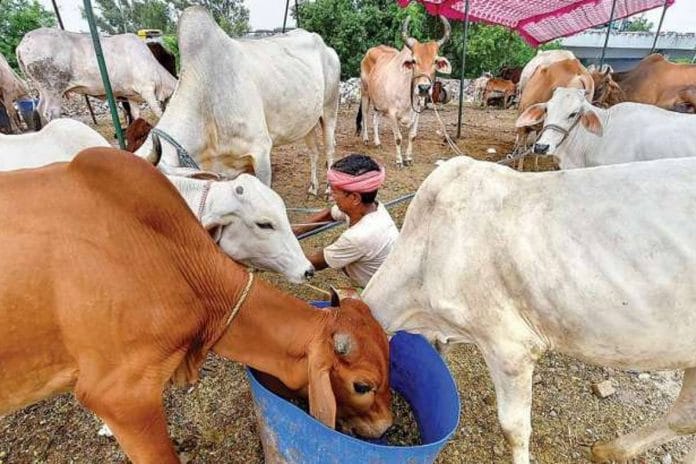New Delhi: A judge of the Allahabad High Court has advocated for cows to be declared “nationally protected animal”, calling them “kamadhenu” or divine, and the “giver of all desires”.
The judge, Justice Shamim Ahmed of the Lucknow bench, made the observations while passing an order on 14 February — incidentally declared as “Cow Hug Day” by the Animal Welfare Board of India, though the directive was later cancelled — on an application pertaining to two men accused of cow slaughter.
Refusing to quash criminal proceedings against the accused under the Uttar Pradesh Prevention of Cow Slaughter Act, 1955, Justice Ahmed referred extensively to scripture and legend while speaking about the qualities of a cow.
He observed that in the last two centuries, there had been a movement to protect cows through demands to ban cow slaughter. “This court also hopes and trusts that the central government may take appropriate decision to ban cow slaughter in the country and declare (the cow) as ‘protected national animal’,” said the judge.
Also read: Muslims can’t use liberal arguments to justify communalism on the cow slaughter issue
The case of Abdul Khaliq
Justice Ahmed was hearing one Abdul Khaliq’s plea to quash criminal proceedings against him in a case in which the Uttar Pradesh Police had intercepted another man named Zahoor with “beef” at a village near Barabanki
The police said Zahoor told them he, along with Abdul Khaliq, was “involved in cow slaughter and going to Lucknow to sell the beef”.
Section 3 of the Uttar Pradesh Prevention of Cow Slaughter Act prohibits the slaughter of cows, bulls and bullocks. Section 5 of the same Act further prohibits the sale of beef or beef products.
The counsel for Abdul Khaliq argued that no chemical analysis had been done to prove that Zahoor was in possession of beef, and said that the chargesheet had been filed and cognisance had been taken in the case in a “routine manner” by the police.
However, the state maintained that cognisance was taken in accordance with the law.
The police chargesheet stated that Zahoor had confessed to the police during the course of investigation that he was involved in cow slaughter.
“Accordingly, the contention of the learned counsel for the applicant that no offence against the applicant is disclosed and the present prosecution has been instituted with a malafide intention for the purposes of harassment, has no force,” Justice Ahmed said, while refusing to allow quashing of criminal proceedings.
Will ‘rot in hell’ for killing cows
In his order, Justice Ahmed observed that India being a secular country, there must be respect for all religions “and in Hinduism” cows were believed to be “the representative of divine and natural beneficence”.
The cow has been associated with various deities like Shiva, Indra and Krishna, said the judge, adding that it “is the most sacred of all the animals of Hinduism”.
Justice Ahmed further stated that a cow’s “legs symbolise the four Vedas (of Hinduism), her source of milk is four Purushartha (or objectives, i.e. dharma or righteousness, artha or material wealth, kama or desire and moksha or salvation); her horns symbolise the gods, her face the sun and moon, and her shoulders Agni, or the god of fire”.
In the order, the judge traced the veneration of cows to the Vedic period (1500 BC to 600 BC), stressing on the prohibition of cow slaughter in epics like the Mahabharata, and Hinduism’s religious and ethical codes known as Manusmriti.
“Subsequently, with the rise of the ideal of ahimsa (non-injury), the absence of the desire to harm living creatures, the cow came to symbolise a life of non-violent generosity,” said the judge, referring to legislation against cow slaughter in the 20th century.
The cow was associated with motherhood and mother Earth, he further observed, while citing legends which state that “Bramha gave life to priests and the cows at the same time”.
“Anyone who kills cows or allows others to kill them is deemed to rot in hell as many years as there are hair upon his body,” Justice Ahmed said.
The judge’s observations follow that of a Gujarat judge who said this January in an order that “religion is born out of the cow and all problems will be solved when cow slaughter is stopped”. In 2021, an Allahabad HC judge had said consuming beef can’t be considered a fundamental right, and that the cow is the only animal that “inhales and exhales oxygen”.
(Edited by Nida Fatima Siddiqui)
Also read: ‘We’re finished’: Farmers, traders say Karnataka cattle slaughter law brought year of misery






